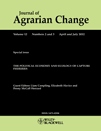
Journal of Agrarian Change
Scope & Guideline
Exploring the Dynamics of Agrarian Transformations
Introduction
Aims and Scopes
- Political Economy of Agriculture:
The journal consistently addresses the political and economic dimensions of agricultural practices, examining how class, caste, and gender interact within agrarian systems. - Social Reproduction and Labor Dynamics:
It explores the social reproduction of labor within agricultural contexts, highlighting the relationships between work, family, and community structures. - Global Food Systems and Neoliberalism:
The journal engages with the impacts of neoliberal policies on global food systems, analyzing the vulnerabilities and resistances that emerge within these frameworks. - Environmental Sustainability and Agrarian Practices:
A focus on the ecological implications of agrarian practices, including sustainability, resource management, and the impacts of climate change on rural livelihoods. - Indigenous and Local Knowledge Systems:
The journal emphasizes the significance of indigenous and local knowledge systems in shaping agrarian change, advocating for their recognition and integration in contemporary agrarian studies. - Land Tenure and Property Rights:
It investigates issues related to land tenure, ownership, and rights, particularly in the context of land grabs and agrarian reform movements.
Trending and Emerging
- Gender and Agrarian Change:
There has been a notable increase in research addressing gender dynamics within agrarian contexts, exploring how gender roles influence agricultural practices, land rights, and social reproduction. - Impact of Global Crises on Agriculture:
Emerging themes focus on the implications of global crises, such as the COVID-19 pandemic and geopolitical tensions like the Russia-Ukraine War, on food systems and rural livelihoods. - Climate Change and Resilience Strategies:
Papers increasingly emphasize the intersection of climate change and agrarian resilience, examining adaptive strategies employed by rural communities to cope with environmental challenges. - Agrarian Social Movements and Activism:
A rising focus on the role of social movements in advocating for agrarian rights, land reform, and sustainable practices reflects a growing interest in activism within agrarian studies. - Technological Innovations in Agriculture:
Research is increasingly exploring the role of technology in transforming agricultural practices, including the implications of digital agriculture and e-commerce for smallholder farmers.
Declining or Waning
- Historical Agrarian Studies:
While historical perspectives on agrarian change were once prominent, there seems to be a shift towards contemporary issues, with fewer papers focusing solely on historical analyses of agrarian systems. - Traditional Agricultural Practices:
Research on conventional farming methods and their socio-economic implications has decreased as the journal prioritizes discussions on innovative practices and sustainability. - Rural-Urban Migration Dynamics:
Although still relevant, studies specifically centered on rural-urban migration as a standalone theme have become less frequent, possibly overshadowed by broader discussions on urbanization and agrarian change.
Similar Journals
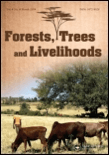
Forests Trees and Livelihoods
Transforming Forestry Insights into Community BenefitsForests, Trees and Livelihoods is a distinguished journal published by Taylor & Francis Ltd, focusing on the intricate relationships between forestry, environmental sustainability, and rural livelihoods. With an ISSN of 1472-8028 and an E-ISSN of 2164-3075, this journal has been a pivotal platform since its inception in 1999, converging on contemporary issues through 2024. Ranked in the Q2 quartile of the forestry category, it stands at rank #77 out of 174 in Scopus, evidencing its significance in agricultural and biological sciences. The journal aims to disseminate novel research findings, policy analyses, and case studies that inform sustainable forestry practices and contribute to improving the livelihoods of communities reliant on forest resources. Through its commitment to quality and accessibility, Forests, Trees and Livelihoods is an essential resource for researchers, professionals, and students striving to enhance understanding and practices in the field of forestry.

Sociedades Precapitalistas
Decoding the Legacies of Pre-Capitalist ErasSociedades Precapitalistas, published by the Universidad Nacional de La Plata, Faculty of Humanities and Educational Sciences, is a distinguished academic journal that specializes in the study of pre-capitalist societies, exploring their structures, cultures, and dynamics. With an ISSN of 2250-5121 and an E-ISSN of 2250-5121, this Open Access journal has been committed to disseminating knowledge since 2011, ensuring that research is accessible to a global audience. Set in La Plata, Buenos Aires, Argentina, the journal serves as a vital platform for researchers, professionals, and students engaged in this niche yet significant field of study. Although specific impact metrics such as H-Index are currently unavailable, its dedication to academic rigor and the relevance of its subject matter highlight its importance for those exploring the socio-economic histories of societies prior to the capitalist era. As the discourse surrounding global history continues to evolve, Sociedades Precapitalistas plays a crucial role in enriching our understanding of past societies and their legacies.
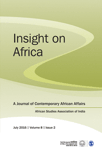
Insight on Africa
Fostering Dialogue on Africa's Development and HistoryInsight on Africa is a distinctive academic journal published by SAGE Publications Ltd, focusing on the multidisciplinary aspects of African studies, including facets of development, history, and political science. With its ISSN 0975-0878 and E-ISSN 0976-3465, this journal serves as a vital resource for researchers, professionals, and students interested in the continent’s socio-political dynamics and historical contexts. Enjoying a reputable Q1 ranking in History and Q3 rankings in Development and Political Science and International Relations, Insight on Africa not only reflects a significant impact in its fields but also aims to foster scholarly discussions and promote knowledge dissemination related to contemporary African issues. While not an open-access journal, its commitment to rigorous academic standards and peer-reviewed content ensures that published research achieves broad recognition, making it essential reading for those engaged in African studies.
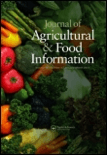
Journal of Agricultural & Food Information
Fostering Dialogue in Agronomy and Food Science.Welcome to the Journal of Agricultural & Food Information, a pivotal platform for disseminating research and insights across the domains of agronomy, food science, and information systems management. Published by Routledge Journals, Taylor & Francis Ltd, this esteemed journal, with an ISSN of 1049-6505 and E-ISSN 1540-4722, plays a crucial role in bridging the gap between innovative agricultural practices and food information systems. Despite its current categorization in the Q4 quartile across relevant fields, it remains committed to fostering scholarly dialogue and encouraging interdisciplinary collaboration. With a history of publication spanning multiple converged years from 1993 to 2024, the journal is dedicated to publishing high-quality, peer-reviewed articles that address the challenges and advancements in agricultural and food information. Currently not available as Open Access, this journal provides valuable insights for researchers, professionals, and students who are eager to harness information for the progress of food security and sustainable agricultural practices. Join the conversation in enhancing our understanding and application of vital agricultural and food-related information.
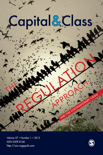
Capital and Class
Illuminating the Intersections of Capital and SocietyCapital and Class is a leading academic journal published by SAGE Publications Inc., dedicated to advancing the fields of Economics, History, Sociology, and Political Science. Since its inception in 1977, this esteemed journal has provided a critical platform for innovative research that examines the complexities of economic structures and their socio-political ramifications. With a distinguished presence in the academic community, it holds impressive rankings, including Q2 in Economics and Econometrics and Q1 in both History and Sociology and Political Science as of 2023. Furthermore, it stands out in the Scopus Rankings, occupying the 98th percentile in History and the 78th percentile in Sociology and Political Science. The absence of Open Access options enhances its exclusivity, making it a vital resource for researchers and professionals seeking substantial scholarly contributions. As it prepares for its next era of scholarship until 2024, Capital and Class continues to illuminate the intricate relations between capital, class structures, and the dynamics of social change, fostering dialogue and discourse among scholars and practitioners alike.
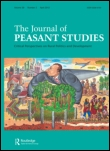
JOURNAL OF PEASANT STUDIES
Connecting Disciplines to Understand Rural DynamicsJOURNAL OF PEASANT STUDIES, published by ROUTLEDGE JOURNALS, TAYLOR & FRANCIS LTD, stands at the forefront of interdisciplinary research, exploring the dynamics of rural communities and agrarian movements within the fields of Anthropology, Cultural Studies, and Arts and Humanities. With an impressive ranking in the 2023 quartiles, positioned in the Q1 category across multiple disciplines, this journal serves as a vital platform for scholars seeking to understand the complexities of peasant lives, land use, and social transformations. Hailing from the United Kingdom and established in 1973, it continues to thrive, maintaining rigorous peer review standards and a focused scope that attracts high-impact research. Although it is not an open-access journal, it provides vital insights and fosters critical dialogue among researchers and practitioners alike, assisting them in addressing contemporary social issues and advocating for rural rights and identities. With an enduring commitment to advancing knowledge and scholarship, the journal plays an essential role in shaping academic discourse in its fields.
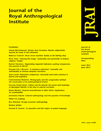
JOURNAL OF THE ROYAL ANTHROPOLOGICAL INSTITUTE
Fostering Dialogue on Global Cultural DynamicsJOURNAL OF THE ROYAL ANTHROPOLOGICAL INSTITUTE, published by Wiley, stands as a prestigious platform for scholarly discourse in the field of anthropology. With an ISSN of 1359-0987 and an E-ISSN of 1467-9655, this journal has been a vital resource for researchers, professionals, and students since its inception, featuring contributions that push the boundaries of understanding in both cultural and social anthropology. The journal’s rigorous peer-review process affirms its high academic standards, reflected in its top-tier Q1 rankings in both the Anthropology and Arts and Humanities categories for 2023. With a current ranking of #78 out of 502 in Social Sciences Anthropology and #138 out of 552 in Miscellaneous Arts and Humanities, it inhabits a critical space within academia, addressing seminal issues and innovative research. While the journal is not open access, it remains accessible to those affiliated with institutions that provide subscriptions, ensuring that groundbreaking anthropological insights are disseminated widely within the academic community. As it converges from 1995 to the present, the JOURNAL OF THE ROYAL ANTHROPOLOGICAL INSTITUTE continues to shape the landscape of anthropological research, engaging a diverse readership eager to explore the intricate tapestry of human cultures.
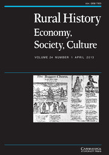
Rural History-Economy Society Culture
Advancing Insights into the Dynamics of Rural History and Culture.Rural History: Economy Society Culture is a vital academic journal dedicated to exploring the multifaceted aspects of rural history from economic, societal, and cultural perspectives. Published by Cambridge University Press, this journal contributes substantially to the field by presenting innovative research that spans a range of disciplines, including history, geography, and urban studies. With a convergence of scholarship from 1990 through 2024, this journal holds significant rankings in the top quartiles of its categories, particularly excelling in History where it ranks in the Q2 quartile. It also demonstrates respectable positions in other arts and humanities domains, reflecting its considerable impact, especially in history-related studies, where it sits in the 76th percentile. While not open access, it provides valuable insights for researchers, professionals, and students passionate about understanding the dynamics of rural societies and their historical underpinnings. For scholars aiming to contribute to this rich dialogue, Rural History serves as an essential platform for disseminating significant findings and advancing knowledge in the field.

LATIN AMERICAN PERSPECTIVES
Advancing Interdisciplinary Dialogue on Regional IssuesLATIN AMERICAN PERSPECTIVES is a leading academic journal dedicated to the critical examination of Latin American social, political, and economic issues. Published by SAGE Publications Inc, this journal boasts an impact in the disciplines of Geography, Planning and Development, Sociology, and Political Science, as reflected in its Q2 rankings for 2023. With its subscription model, it ensures broad accessibility to cutting-edge research and diverse perspectives on Latin American studies. Established in 1977 and converging in publication years from 1984 to the present, the journal features articles that advance scholarly discourse and foster interdisciplinary dialogue among researchers, professionals, and students alike. Recognized in Scopus for its contributions, LATIN AMERICAN PERSPECTIVES continues to be a pivotal resource for those seeking to deepen their understanding of complex regional dynamics and contribute to the global conversation surrounding Latin America.

Agricultural and Resource Economics-International Scientific E-Journal
Fostering collaboration in Eastern European agriculture.Agricultural and Resource Economics-International Scientific E-Journal is a leading open-access publication dedicated to advancing the fields of agricultural and resource economics. Published by the esteemed INST EASTERN EUROPEAN RESEARCH & CONSULTING since 2015, this journal provides a vital platform for innovative research and discourse, particularly within the context of Eastern Europe. With an impressive Q2 ranking in Agricultural and Biological Sciences and Q3 rankings in both Business, Management and Accounting and Marketing, it serves as a key resource for academics and practitioners alike, fostering collaboration and knowledge exchange. The journal's commitment to accessibility and inclusivity is evident through its open-access policy, allowing researchers from around the globe to share and benefit from cutting-edge findings. Set against the backdrop of a rapidly evolving agricultural landscape, this journal plays a crucial role in exploring the intersection of economics, sustainability, and resource management, making it an essential read for anyone invested in the future of these critical fields.